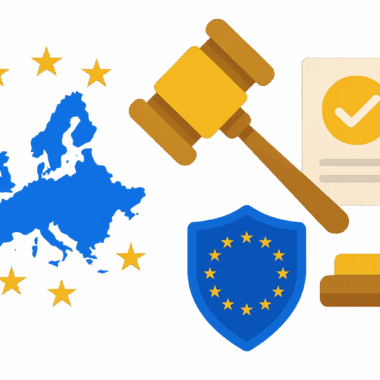

iGaming Regulations Across the EU – A Complete Guide in 2025

Content:
- EU-Wide Regulatory Landscape
- Key 2025 Trends in Regulation
- Country-by-Country Breakdown
- Advertising & Technology Compliance
- Responsible Gambling
- Licensing & Legal Frameworks
- Costs & Operational Impact
- Operator Strategies
- Outlook: Future of EU iGaming Regulation
- Conclusion
- FAQ
The iGaming sector across the European Union has evolved significantly in recent years. In 2025, operators and affiliates must navigate an increasingly complex regulatory landscape, driven by ongoing iGaming regulatory updates and changing enforcement priorities across Europe. This environment is shaped by national frameworks, EU-level directives, and the growing use of compliance-driven technologies.
This guide examines the current state of the iGaming industry in Europe in 2025, with a focus on iGaming regulation in the EU. It explores regional regulatory trends, iGaming regulation news across Europe, country-specific developments, licensing structures, compliance costs, and strategic considerations for operators seeking to remain compliant and competitive in regulated European markets.
EU-Wide Regulatory Landscape
Unlike some other digital industries, iGaming regulation in Europe does not operate under a single unified legal framework. Instead, each EU member state retains the authority to regulate gambling activities within its own jurisdiction. This has resulted in a fragmented regulatory environment, although gradual convergence can be observed through shared policy goals and enforcement practices.
At the same time, EU-level legislation plays a critical role in shaping iGaming regulations across the region. Key frameworks such as the General Data Protection Regulation (GDPR) and the Digital Services Act (DSA) impose binding obligations on operators. These laws directly affect data protection standards, consumer rights, and transparency in digital advertising—areas that feature prominently in iGaming regulation news in Europe.
Key 2025 Trends in Regulation
In 2025, iGaming regulatory updates across the EU indicate a clear shift toward stricter consumer protection and risk-mitigation measures. National regulators are increasingly tightening controls on advertising practices and bonus promotions to reduce problem gambling and enhance player safety.
Key iGaming regulation trends in Europe for 2025 include:
-
Stricter limitations on promotional content, particularly advertising that could appeal to minors.
-
Mandatory affordability and risk checks for high-value or high-risk players.
-
Increased cross-border cooperation between regulators to combat unlicensed operators and enforce iGaming regulations more effectively.
Country-by-Country Breakdown
iGaming regulation varies significantly across the EU. Some countries, like Malta and Estonia, maintain liberal frameworks designed to attract operators, while others, such as France and Germany, impose stringent control mechanisms.
Here’s a snapshot of notable jurisdictions:
- United Kingdom: Implements affordability checks and stake limits.
- Germany: Enforces state monopoly on online table games.
- Netherlands: Proposes universal deposit limits and ad restrictions.
- Malta: Offers a streamlined licensing process under MGA oversight.
Advertising & Technology Compliance
Compliance in 2025 increasingly focuses on the ethical use of advertising and deployment of advanced technology in player monitoring. The DSA, in particular, mandates transparent ad disclosures and prohibits microtargeting based on sensitive user data.
To stay compliant, operators must:
- Clearly label all paid advertisements.
- Avoid targeting underage audiences.
- Use AI-powered tools for real-time risk assessment and Know Your Customer (KYC) processes.
Responsible Gambling
Regulators are prioritizing responsible gambling measures more than ever. Operators are required to implement tools that help players set deposit limits, self-exclude, and access support services.
Best practices in responsible gambling include:
- Integration with national self-exclusion registers.
- Mandatory display of session timers and loss limits.
- Routine auditing of player behavior and intervention mechanisms.
Licensing & Legal Frameworks
Obtaining a license in the EU varies by jurisdiction. While Malta and Estonia offer favorable conditions for international operators, other countries like France and Germany have more restrictive and costly licensing regimes.
Below is a comparison table of selected countries:
| Country | License Duration | Capital Requirements | Avg. Approval Time |
|---|---|---|---|
| Malta | 5 years | €100,000+ | 3–6 months |
| Estonia | 10 years | €50,000+ | 3–4 months |
| Germany | 5 years | €360,000+ | 6–12 months |
| France | 5 years | €1,000,000+ | 8–12 months |
Costs & Operational Impact
Compliance costs are rising across the EU. These include license fees, legal counsel, software for AML/KYC, and regular audits. Operators must also budget for ad compliance and responsible gambling tech.
In contrast, offshore jurisdictions may offer lower costs but expose operators to reputational and legal risks. EU regulation, while stricter, offers stability, consumer trust, and access to key European markets.
Operator Strategies
To thrive in this environment, operators must adopt proactive compliance strategies. Centralized compliance teams and automated monitoring tools can significantly reduce regulatory risk.
Recommended strategies include:
- Investing in regtech solutions.
- Partnering with legal experts in each jurisdiction.
- Maintaining transparent policies for bonuses and customer support.
Outlook: Future of EU iGaming Regulation
Looking ahead, the EU may continue moving towards harmonization, especially in advertising standards and AML/KYC procedures. Regulators are expected to tighten rules around digital wallets and cryptocurrencies.
Operators should prepare for:
- Stricter enforcement of responsible gambling.
- Mandatory integration with EU-wide self-exclusion databases.
- Enhanced reporting obligations on financial transactions.
Conclusion
iGaming in the EU remains a dynamic and highly regulated industry. As 2025 progresses, operators must remain vigilant and agile to maintain compliance and build player trust.
By aligning with local laws and anticipating future changes, businesses can secure their foothold in one of the world’s most lucrative gaming markets.
FAQ
Q: Is online gambling legal in all EU countries?
A: No, each member state has its own laws. Some allow all forms of online gambling, while others permit only specific games or ban it entirely.
Q: What are the main compliance challenges for new operators?
A: New entrants often struggle with understanding jurisdiction-specific requirements, integrating KYC/AML systems, and managing costs related to licensing and responsible gambling tools.
Q: Can cryptocurrency be used in EU-regulated iGaming platforms?
A: Some jurisdictions allow crypto transactions under strict conditions, requiring full traceability and AML compliance. However, adoption varies, and not all regulators accept digital currencies.
Q: How long does it take to obtain an EU gaming license?
A: Approval times vary by country, ranging from 3 months (Estonia) to over 12 months (France or Germany).

Lead Distribution Explained: How Smart Routing Increases ROI
Lead distribution is a foundational process in revenue operations that directly affects conversion rates, sales efficiency, and overall profitability. In competitive digital markets, generating leads is no longer enough - how those leads are assigned and processed determines whether marketing investments translate into revenue.





